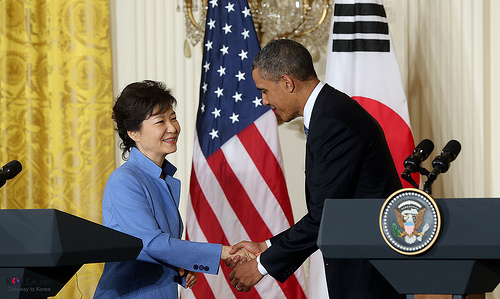
Successful summits tend to be more about symbolism than substance. South Korean President Park Geun-hye’s summit with US President Barack Obama certainly had its share of symbolism: the first foreign trip of the ROK’s new first woman President, 60th anniversary of the US-ROK alliance, and US-ROK messages to North Korea, to Japan and China.
But Ms. Park’s US trip rose above mere symbolism on a number of important fronts. It marked a deepening institutionalization of the US-ROK alliance beyond defense into a larger partnership encompassing economics and global cooperation.
In her one-on-one meeting with Obama, in her well-received speech to a Joint Session of the US Congress, and in an interview with the Washington Post President Park outlined her approach to North Korea, one that was endorsed by Obama and in the US-ROK Joint Statement.
New North Korea Policy
President Park is pursuing a different approach to Pyongyang than her predecessor, Lee Myung-bak, though they are from the same conservative political party. During Lee’s tenure, North-South ties hit new lows as confrontations such as the sinking of the ROK naval ship, Cheonan, and the shelling it Yeongpyeong Island in 2010 inflamed tensions and angered the South Korean public. Lee’s hardline policy and demand for reciprocity from the North was a shift from the previous ROK “Sunshine policy” begun by Kim Dae Jung, which offered aid and cooperation to North Korea despite of a lack of reciprocity.
Instead, President Park wants to pursue a “trust-building” process with North Korea, maintaining deterrence, but keeping a window for dialogue and cooperation and humanitarian assistance, hoping to induce North Korea to comply with its previous denuclearization obligations. This approach was explicitly supported by President Obama. Park referred to a Korean saying that “it takes two hands to clap.” Obama stressed that there was no distance between US and ROK policies and that, “The days when North Korea could create a crisis and elicit concessions, those days are over.”
NE Asia
President Park, according to news reports, raised the troubling issue of Japanese revision of history in her discussions with Obama, and publicly, both in her address to the US Congress, and in interview in the Washington Post. Park told the Post that she was “disappointed and frustrated at the lack of progress in relations with Japan.” She complained that “the Japanese have been opening past wounds and have been letting them fester, and this applies not only to Korea but also to other neighboring countries. While she did not mention Japan by name to the US Congress, her speech did say that “differences from history are widening,” adding that “those who are blind to the past, cannot see the future.”
In regard to China’s support for North Korea, President Park noted some changes in Beijing’s policy when Xi Jinping took office but said in an interview that China could exert more influence to change North Korean behavior, but that if North Korea,” chooses not to take the right path, “that she would ask China to rethink whether its current policy toward North Korea, “is sustainable.”
One little noticed initiative from the Park visit was her call to create a new multilateral dialogue process in Northeast Asia to address the deficit of political security cooperation. Park suggested it could start focusing on environmental issues, nuclear safety, counterterrorism and disaster relief and then build a wider agenda. She appeared to be thinking of the five parties in the now lapsed six-party talks, but added that North Korea might be invited.
While the US and ROK reaffirmed commitments to implement the US-ROK Free Trade Agreement (FTA), it was unclear whether A NE Asia grouping would address trade or whether the issue of Seoul joining the Trans-Pacific Partnership (TPP) was discussed. The US-ROK FTA is a high quality accord largely compatible with the goals of TPP, the negotiations for which Japan has recently agreed to join.
At a time of tension and uncertainty in Asia, the Park trip to the US clearly was about more than symbolism. But whether expectations that the diplomacy will yield more than modest progress in addressing the North Korea problem or frayed ROK-Japan or Sino-Japanese relations are warranted is unclear. Yet the Park trip accomplished several noteworthy things: it clearly energized US-ROK relations; it has put some interesting new ideas on the table for Northeast Asia, and not least, it showcased President Park Geun-hye as an assertive new Asian leader determined to meet the challenges facing NE Asia.
Robert A. Manning is a senior fellow at the Atlantic Council’s Brent Scowcroft Center on International Security. This piece first appeared on Global Times.
Photo credit: Korea.net
Image: 8723273026_36f5cd89b0.jpg
